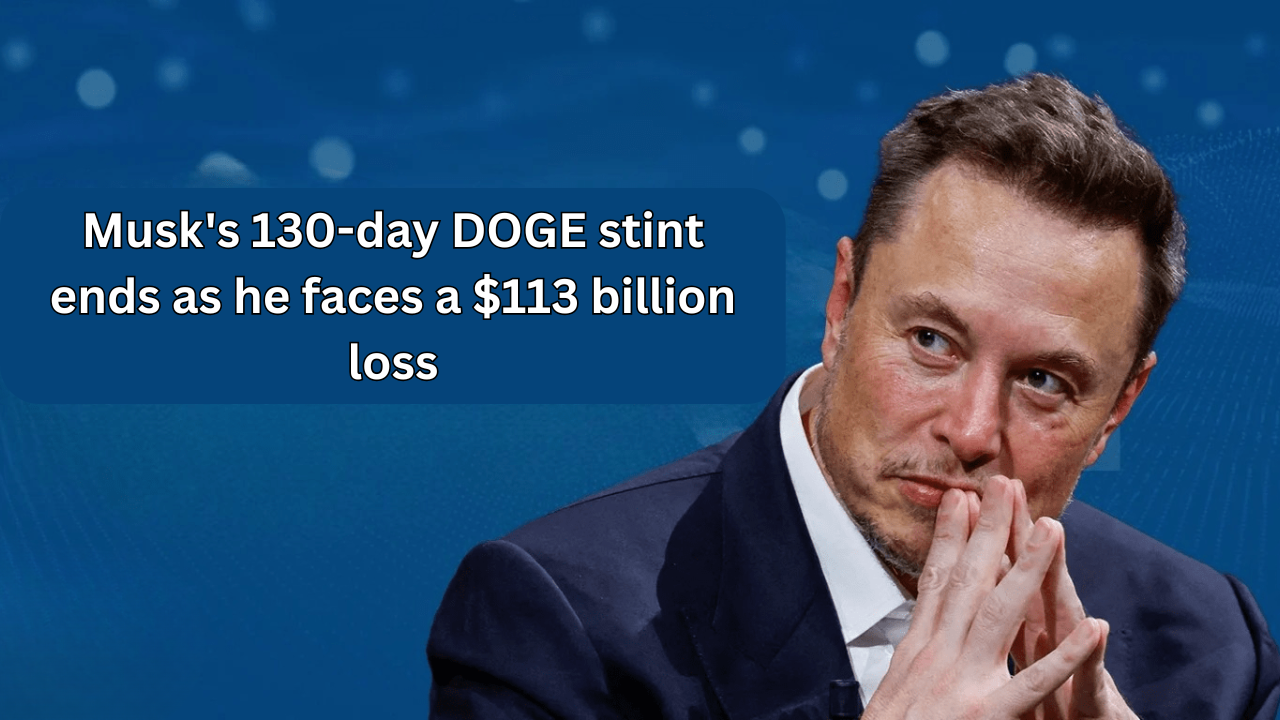Elon Musk, the billionaire CEO of Tesla and SpaceX, is set to conclude his temporary role in government as the head of the Department of Government Efficiency (DOGE) after a brief, yet controversial, 130-day stint. Appointed by the Trump administration, Musk’s tenure was originally intended to spearhead efforts to overhaul federal spending, but it has now ended amidst a series of setbacks. As the tech mogul wraps up this phase of his career, reports reveal that he’s facing a staggering $113 billion loss in net worth. While his time in the government spotlight may be winding down, the implications of his decisions remain significant.
The DOGE Role: A Short but Turbulent Term
Musk’s appointment as head of DOGE was met with excitement and skepticism. His reputation as a businessman known for shaking up industries made him an unconventional, yet intriguing choice to lead the government efficiency initiative. The mission was clear: streamline government spending and reduce inefficiencies within federal agencies. Musk’s tenure was marked by bold, sweeping proposals to cut wasteful programs and redirect funds into more productive initiatives. However, the results have been far less than anticipated.
During his time in office, Musk made headlines for his aggressive stance on budget cuts and his push for efficiency measures that he believed could save taxpayers trillions of dollars. Yet, his leadership style, which often clashed with entrenched government bureaucracy, led to tensions with various government officials. These conflicts undermined the broader goals of his mandate, and many of his proposals were either delayed or altered by Congress.
Despite Musk’s claims that his actions could save up to $2 trillion, the final projections suggest a much lower impact—around $150 billion. Critics argue that Musk’s approach was too extreme and failed to account for the complexities of managing government programs. Moreover, his critics point to the public backlash and resistance from career civil servants who questioned his ability to lead effectively in a public-sector role.
Musk’s Net Worth: A Sharp Decline
While his stint in DOGE was intended to save the government billions, Musk’s personal wealth has taken a significant hit. According to recent reports, Musk’s net worth has dropped by $113 billion during this period, largely due to the underperformance of Tesla and his personal investments. Tesla’s stock, which has been one of the most valuable in the world for years, has faced significant declines over the past months, compounded by concerns about production delays and increasing competition in the electric vehicle market.
Musk’s decision to divert more of his attention to his government role and away from Tesla and SpaceX has raised eyebrows among analysts. His ventures in space exploration and electric cars have long been central to his fortune, and many question whether his focus on public-sector efficiency cost him valuable business time. As his wealth continues to dwindle, it remains to be seen whether Musk’s involvement in DOGE will have lasting benefits for the country or simply be remembered as an ill-fated experiment.

Legal Battles: The Dogecoin Saga
Musk’s government role was not the only source of controversy during this period. He also found himself embroiled in a lengthy legal battle regarding his influence on the cryptocurrency market. In 2022, a class-action lawsuit was filed by Dogecoin investors accusing Musk of manipulating the price of the cryptocurrency through his social media posts and public endorsements.
The lawsuit, which sought $258 billion in damages, claimed that Musk’s actions were intended to inflate Dogecoin’s value for his personal gain. However, in August 2024, a judge dismissed the lawsuit, ruling that Musk’s statements about Dogecoin were “aspirational” and not factual, making them unreliable grounds for a securities fraud claim. Musk and his legal team celebrated the dismissal as a victory, but the case highlighted the risks of public figures influencing volatile markets like cryptocurrency.
Despite the lawsuit’s dismissal, Musk’s influence on Dogecoin remains a subject of debate. His social media presence and public endorsements have undeniably contributed to Dogecoin’s rise, but whether this constitutes market manipulation remains unclear. For many, Musk’s handling of the legal case and the cryptocurrency market has only added to the complexity of his public persona.
What’s Next for Musk?
As Musk prepares to step back from DOGE in May 2025, questions about his next steps remain unanswered. Sources close to Musk say that he plans to reduce his involvement in government affairs to focus more on his business ventures, particularly Tesla and SpaceX. The news comes after a period of increased pressure on Musk, with critics questioning his ability to balance his role in government with his high-profile tech ventures.
Musk’s return to Tesla comes at a critical time for the company, which faces growing competition from established car manufacturers and new electric vehicle startups. Additionally, SpaceX, Musk’s aerospace company, is entering a new phase with upcoming missions and contracts that could shape the future of space exploration. With these responsibilities awaiting his attention, it’s clear that Musk will continue to be a dominant figure in both the business and technology sectors.
A Government Legacy: Efficiency or Chaos?
Musk’s brief time at DOGE will likely be remembered as a time of both ambition and controversy. While his supporters point to his bold initiatives and the potential savings from government reforms, others see his tenure as a cautionary tale about the challenges of translating private-sector success into public-sector leadership. His approach to efficiency and government spending may have been too radical for Washington’s entrenched systems.
Ultimately, the end of Musk’s government role will not be the end of his influence. Whether in the business world or on the global stage, Musk’s actions will continue to shape the future of technology, space exploration, and even finance.
For more information on the Department of Government Efficiency, visit the official Government Efficiency website.
Final Thoughts
Elon Musk’s time at the Department of Government Efficiency (DOGE) was short but eventful. His ambitious attempts to streamline government spending faced resistance, and his $113 billion loss highlights the personal risks of balancing multiple ventures. While his government role ended with mixed results, Musk’s influence on tech, space, and cryptocurrency remains strong. His time in DOGE may serve as a lesson for future attempts at reforming the public sector, but Musk’s disruptive impact is far from finished.

Pankaj Kumar is a skilled content writer at OTE News, focusing on breaking news, technology, and socio-political developments. With a background in Mass Communication, he brings a balanced perspective to his articles, ensuring clarity and reliability. Pankaj has a knack for simplifying complex topics for readers.
In his free time, he enjoys photography, traveling, and experimenting with new cuisines. His curiosity and dedication to truthful reporting make him a valuable contributor to OTE News.




